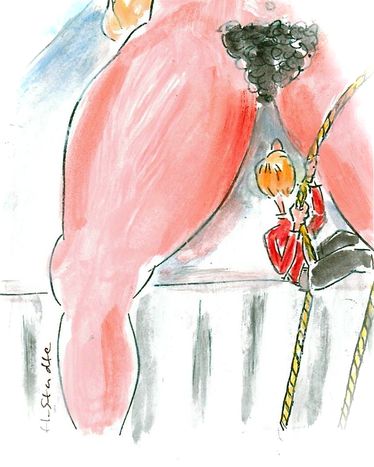
I wasn't born yesterday
Published on
Translation by:
Cafebabel ENG (NS)It’s not like we talk about sex all the time during cafebabel.com’s weekly editorial meetings, but when one editor innocently asked what bondage was last week, we couldn’t help but marvel at their being so ‘wet behind the ears’
There’s an inverse balance between sexual knowledge and correctly processing the terminology behind it when out of context. So you don’t know what bondage is? I wasn’t born yesterday! crow the Brits, in unity with the Poles, Italians and Spanish (no naci ayer). The Polish man behind the sweet stall who’s trying to sell you an overpriced pączek? ‘Nie urodziłem się wczoraj’. The taxi driver in Rome who’s charging you as if Sofia Loren was taking the ride with you? ‘Non sono nato ieri!’ In fact, it would most likely be the Brits who would be taking you for a ride.
The eyes and the ears are a favourite for referring to innocent beings like our editor, who is now acquainted with ‘bondage’ (well...) When the Brits are not pullling the wool over your eyes, they are accuse you of being wet behind the ears, like newborn animals bucking onto their first hind legs. In German, the expression translates to someone's being 'green behind the ears' (Grün hinter den Ohren sein). In keeping with the just-born expression, they teasingly ask if you still believe that the stork brings babies (Noch an den Klapperstorch glauben).
German exasperation can also stretch to utter exaggeration when they accuse you of 'living behind the moon' (Hinter dem Mond leben). Other prime locations for a gullible person would be on an island in France (Il/Elle vit sur une île), in the river crossing the Irish capital (I didn’t just float up the Liffey), and across the United States (I didn’t fall off the turnip truck yesterday). In the most poetic of the expressions, the French assure us that they were not 'born with the last rain storm' (Ils/Elles ne sont pas né(e)s de la dernière pluie). Born yesterday, our idiomatic Frenchmen will never be great inventors of items as banal as powder, warm water or a butter knife (Il/Elle n’a pas inventé la poudre/l’eau tiède/le fil à couper le beurre). Tie that one up.
Illustration: © Henning Studte
Translated from “Bondage? Mais qu'est-ce que c'est…?”



